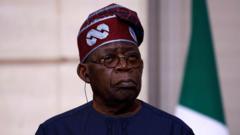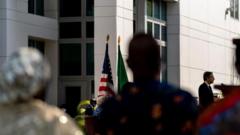In Nigeria, President Bola Tinubu's recent appointments have ignited fears of ethnic favoritism, particularly towards his Yoruba community, amid rising tensions surrounding the distribution of key government roles and national unity.
Ethnic Tensions Rise Over Presidential Appointments in Nigeria

Ethnic Tensions Rise Over Presidential Appointments in Nigeria
As concerns over ethnic imbalance in Nigeria's political appointments grow, President Bola Tinubu faces scrutiny for favoring his Yoruba group.
In Nigeria's diverse political landscape, there exists a long-standing, albeit informal, understanding that presidential appointments should reflect the country's myriad ethnic and religious groups. However, recent developments have raised alarm over potential disruptions in this balancing act, especially as President Bola Tinubu's choices come under increasing scrutiny.
Historically, the Nigerian Constitution mandates regional representation in cabinet roles, but unofficial practices have aimed to preserve national harmony among a population that includes over 250 ethnic groups, with the three largest being the Hausa-Fulanis, Igbo, and Yoruba. Critics argue that since taking office in May 2023, Tinubu has favored his own Yoruba ethnicity, a charge his administration vehemently denies.
Concerns around perceived ethnic bias are not without foundation; they have deep roots in Nigeria's fraught socio-political fabric, which has been marred by historical tensions that nearly tore the country apart. Political observers have pointed out that Tinubu's selection of another Muslim to partner him in the most recent election starkly deviated from the practice of forming a mixed Muslim-Christian ticket, reflecting Nigeria's roughly even religious distribution.
A key point of contention lies in the appointments to eight crucial positions that control the country's security and financial infrastructure, including the central bank and the police force. All eight top roles are currently held by individuals from the Yoruba ethnic group, which is unprecedented in Nigeria’s post-colonial history. Comparatively, previous presidents such as Goodluck Jonathan and Muhammadu Buhari exhibited more ethnic and regional balancing in their appointments.
Professor Tijjani Naniya has voiced concern that if such trends persist, the ramifications could severely undermine the unity of Nigeria. Many in the northern regions, particularly among the Hausa-Fulanis, are voicing alarm over the apparent concentration of power within the Yoruba community, particularly following controversial dismissals like that of Abdulrasheed Bawa, the former head of the Economic and Financial Crimes Commission, who was viewed by many as a scapegoat for political maneuvering.
Tinubu’s spokespersons assert that the administration remains committed to diversity and representation, pointing to data that indicates a mix of appointments across regions. Yet, critics argue that the significant presence of Yoruba individuals in key government roles reflects a worrying pattern of favoritism.
Political figures within Tinubu's own All Progressives Congress have also expressed discontent. Senator Ali Ndume from the north remarked publicly on the president's “non-inclusive” approach to appointments, questioning the sincerity of Tinubu's agenda for national unity.
As Nigeria navigates these troubling waters, many are left to wonder not only about the impact on national cohesion but also about the broader implications for democratic legitimacy as citizens grapple with the realities of ethnicity in governance. For now, experts suggest a need for leadership that transcends ethnic divisions to heal a nation profoundly aware of its diverse identities.





















